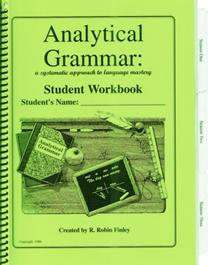
Analytical Grammar by Robin Finley and contributing author Erin Karl is just what the quote above suggests – concise, systematic, thorough and completed in three simple “seasons”.
Meant to be taught in middle school during ten weeks of the 6th grade year, eight weeks of the 7th grade year and 17 weeks of the 8th grade year, the three seasons can be easily modified and completed in one or two years time as desired. However, I’ll be discussing the plan as intended since this is how I am using it with my 6th grade son.
In season one (ten weeks of 6th grade), the student is taught (at a pretty fast pace) mostly about parts of speech. Don’t be fooled – the parts of speech are rather in-depth and cover such things as interrogative pronouns, antecedents, modifiers of prepositional phrases and the like. For each new concept, there is a teaching sheet that you go over with your child. Following, there are at least two or three practice worksheets where your child is expected to label and/or diagram sentences. At the end of each concept’s set of worksheets, there is a test to administer and grade. Each concept’s lessons and test should be completed within one week’s time. Additionally, there is a writing assignment during the week where your child is asked to paraphrase a paragraph in his own words to promote both reading comprehension and writing skills.
(If you would like to use the program with an older child, you may move at a faster pace during the week or allow him to test out of various concepts.)
During season two (eight weeks of 7th grade), grammar takes a further dive into the world of participial phrases, gerund phrases, infinitive phrases, appositive phrases, adjective and adverb clauses and more. Again, sentence labeling, diagramming and rewriting are the main modes of practice, with tests following each covered concept.
During season three (17 weeks of 8th grade), your student will use his prior knowledge of grammar to begin understanding and using punctuation well. Commas, quotations, colons and semicolons, possessives and more are covered. Trust me when I say that this is far more than a review from 3rd grade punctuation lessons. However, I have found this section to be a “breather” from the intense grammar lessons from season two. 🙂
The program comes with two very nice 1 1/2″ binders. One for the student and one for the teacher. The teacher’s guide is almost exactly like the student book, except with all the answers filled in for you! You don’t need additional teaching material because the lesson teaching sheets are meant to be read by the student and are self-explanatory. In fact, the authors suggest removing completed worksheets from the notebook as it’s completed leaving only the lesson notes. In the end, you’re left with a nice grammar reference guide.
Oh, and I ought to mention that even though the lessons can be pretty intense at times, an open-note policy is suggested – even for tests. Yeah, my kids really like that idea, too.
What do you do the rest of the year if the grammar lessons only last for so many weeks? If you like, you may keep grammar skills sharp by using Reinforcement and Review Worksheets. This book of worksheet and answer keys consists of 28 lessons that can be completed once per week. Simple paragraphs from literature and poetry are read, parsed (labeled for parts of speech) and paraphrased. Five additional sentences are supplied with each lesson for more parsing practice if needed. These lessons once a week should keep skills sharp until the next “season” rolls around.
Besides using this program (slower than suggested) with my 6th grade son, I’m doing a faster tour through the book with my 9th grader as part of her English 1 credit. I’m excited to use the High School Reinforcement book, The Great American Authors as a follow-up, too. Similar to the Reinforcement and Review Worksheets for middle school, the high school reinforcement book supplies parsing, diagramming, punctuation and usage practice using biographical information about famous American authors. As we read through some of the works of these authors during her high school years, she’ll already be familiar with the authors! (These are available for British authors, World Authors and Shakespeare’s plays, too.)
In conclusion, Analytical Grammar is no easy-peasy course. In fact, at times, it can be pretty intense. However, it’s very incremental, and the directions and explanations are clear. In the end, your student will have an excellent knowledge and usage of grammar and punctuation!
Before I end, you ought to know that there is a Jr. Analytical Grammar program available to introduce your 4th or 5th grader to the world of grammar. While the authors don’t feel it’s necessary to begin grammar early, they created this program for younger children after many parent requests.
-Cindy West is an eclectically Charlotte Mason mom of a 9th grader, 6th grader and K4. You can find her blogging at Our Journey Westward and find her NaturExplorers studies and other creative curricula at Shining Dawn Books.

Leave a Reply